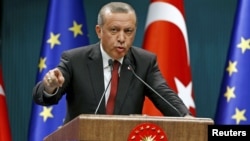A little-used Turkish law against insulting the president is gaining new life. Well-known journalists and, increasingly, ordinary citizens, are being prosecuted and even jailed under the law.
The rise in cases comes as Turkey heads into November parliamentary elections in which President Recep Tayyip Erdogan is expected to play a lead role campaigning for his AK Party.
In Turkey, the crime of insulting the president carries a four-year prison sentence, though the decades-old law was seldom, if ever, used by Turkish heads of state.
With the election last year of Erdogan, however, there's been an alarming change, according to chief Turkey researcher Emma Sinclair Webb of U.S.-based Human Rights Watch.
"What started off as a law that was laughable has become widely used against journalists and people who are well known, but also against ordinary citizens who may say things on Facebook or may join a protest," said Webb. "We saw a load of young political activists for insulting the president. It's extremely concerning."
Defending crackdown
This month, a court handed down an 11-month suspended prison sentence to a 17-year-old schoolboy charged with accusing the president of corruption.
In a separate case, a man is under house arrest for a Facebook comment in which he blamed the president for the July collapse of a cease-fire with the Kurdish rebel group the PKK, and the resulting growing death toll of soldiers. News magazines critical of the president have been raided by security forces and Erdogan supporters.
Defending the prosecution of the student, Prime Minister Ahmet Davutoglu said, "Whoever the person is, he should respect the authority of the president."
Local human rights groups say prosecutions accelerated after Erdogan’s AK Party lost its parliamentary majority in June elections.
Wider trend
Sinan Ulgen of the Carnegie Institute in Brussels said the prosecutions are part of a wider, worrying trend in Turkey.
"This is a symptom of the current degree of both polarization and loss, and regression of democratic norms and practices and the rule of law, and illustrates the loss of dependence of the judiciary more than anything else," said Ulgen.
With Turkey heading to the general election in November and Erdogan’s role as president set to be a key issue in the vote, observers predict criticizing the president likely will be increasingly risky.




